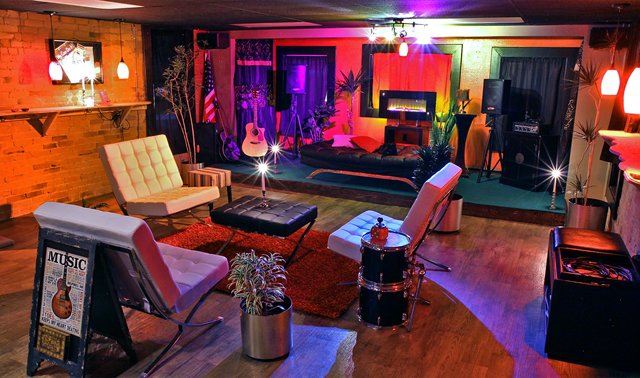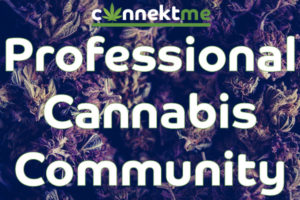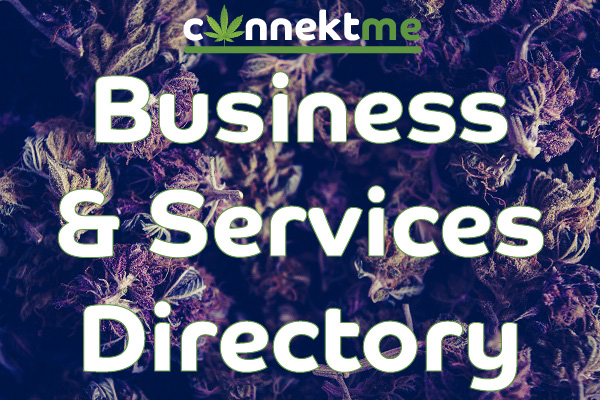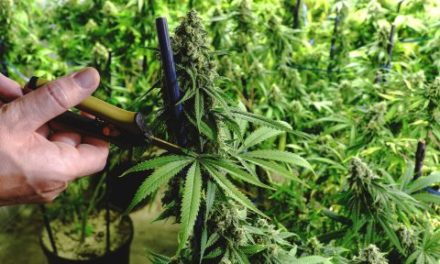A Colorado city is forcing its pot clubs to shut down in five years. So one owner decided to save her business by changing the laws at the state level.
What, exactly, is social cannabis consumption? Should social consumption include weed sales at clubs, or should clubs simply provide a space for consumers to toke with friends?
In other words, can a pot club survive as a business if it can’t actually provide pot?
“You can’t let someone open up a pizza shop, but also make people bring their own pizza dough in order to enjoy a slice of pie,” Ambur Rose Racek, the owner of Studio A64, a pot club in Colorado Springs, told MERRY JANE. “It’s not a good business model, and it doesn’t make sense.”
While West Hollywood will host the nation’s first social consumption lounge that can legally sell weed, California’s new “pot cafés” won’t be the first licensed clubs. America’s first legally licensed lounge is Studio A64, founded in 2012 — the same year that voters approved Colorado’s recreational weed law, Amendment 64.
But Amendment 64 didn’t lay out a framework for social consumption, nor did it define exactly what social consumption is. Additionally, Colorado’s legalization law allowed cities to “opt out” of recreational pot sales, and (not so surprisingly) Colorado Springs City Council voted to bow-out in 2013. Bummed by the city’s ban on adult-use pot shops, Studio A64’s founder sold the business in 2015 to Ambur Rose Racek, a Colorado Springs native.
Racek understood she was inheriting a legal headache. So she jumped into legislative game to make the situation better. “That was kind of my goal from the beginning, even if I didn’t quite know it back then,” she said. “As soon as I got into the industry and saw how things were and weren’t working, I realized pretty quickly how [social consumption] needed to work: [licensed clubs] provide weed legally, taxed and tracked, the same way that everybody else does it.”
Initially, Colorado Springs hosted over a half-dozen pot clubs, and all of them, at some point, sold weed onsite by accepting cash “donations.” The city didn’t buy that argument, however. In retaliation, the council created an ordinance that forced all clubs to close by 2024. Only Studio A64 and another club renewed their licenses.
Determined to pull Colorado’s pot clubs out of a BYOB business model, Racek pushed for new social consumption reforms, but not with the city. This time around, she worked with the non-profit Southern Colorado Cannabis Council — and the social-use proponents won.
Last year, Racek publicly backed HB 1230, the so-called “Marijuana Hospitality Bill.” This statewide bill creates a business license for social consumption venues like Studio A64. And the best part is that clubs can sell weed directly to their patrons. The bill received the governor’s signature in May.
Alas, Studio A64 remains caught between a new, revolutionary state law and an older city ordinance that orders Racek to permanently close her business in five years.
To find out how Studio A64 is doing (read: surviving) in a conservative city that loves weed but doesn’t want people loving it openly, MERRY JANE caught up with Racek via phone to chat about how the business has fared since we last spoke, what social consumption truly offers, her plans for the near future, and what other cities and states can learn from Colorado’s mistakes.
This interview has been edited for length and clarity.
Above, a photo of Studio A64
MERRY JANE: You already have a licensed weed club. Why push for a statewide bill to create social consumption licensing?
Ambur Rose Racek: We really can’t survive on the model that we run right now. It’s confusing to people. People assume that they can come here and purchase [cannabis] in the lounge — and they should be able to, because that makes sense.
Tourists come in with limited amounts of money, and they’re expecting a certain type of experience. But when they get here, it’s not what they were expecting. It makes their vacation more of a chore than anything. If they want to experience legal social consumption, we have to send them to a [recreational] dispensary — but we don’t have one in Colorado Springs. They have to travel to Pueblo, Denver, or Manitou Springs to acquire product just to bring it back [to Studio A64] to smoke. A lot of people travel to Colorado not knowing that, and we just end up losing those customers completely.
It really sucks! We lose money all day long because of it. So, it’s been a long couple of years trying to run the model this way, and it just doesn’t work. We’ve been able to stay open thanks to local dispensaries who’ve rented our space for private events. That’s helped us out a lot.
Once we’re able to provide the product, I would see the tourists making up 80 to 85 percent of our total business sales.
Would you be able to reapply or receive a modified license once Colorado’s hospitality/social consumption program kicks off?
I can’t really say anything about that right now — mostly because I don’t know. The rule-making for the actual licenses doesn’t start until October, then we have to deal with the fact that the city still doesn’t allow recreational sales.
To have a [social consumption] license like this, we don’t necessarily need recreational dispensaries [in Colorado Springs]. There are counties considered “dry counties” that have bars but not liquor stores. Studio A64 could work under the same concept. We think that because we have followed the rules and been so respectful toward what the city wished, that they would live up to their end of the bargain and issue us a license now that there’s one available with the state. So, we really just have to wait to see what happens.
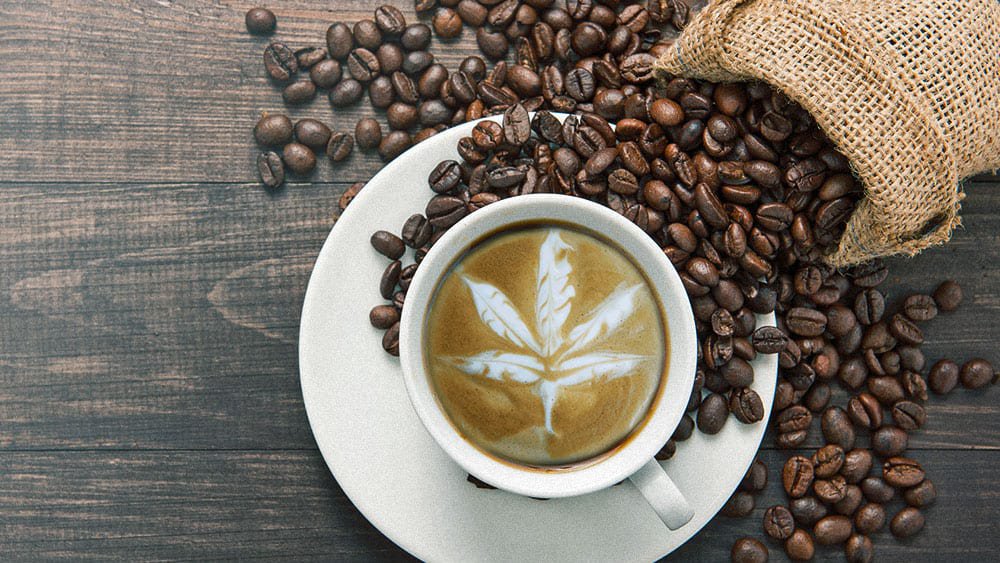
Last year, you started offering CBD products at Studio A64, including CBD dabs and edibles. Has that been successful?
In the [recreational] cannabis community, which we’re more geared toward, CBD is kind of a bad word. It turns people away, a lot. Unless you’re educated about CBD and have had an introduction to CBD, a lot of people are turned off by it. There are a lot of different rumors about how it works, how it doesn’t work, and it really depends on the person.
For a lot of people who suffer from some ailment, they can feel an effect from CBD. It’s not necessarily that they feel something from it, but rather that they stop feeling what’s ailing them.
You once mentioned that you were planning to expand your business, but you couldn’t give any details at the time. Is that still in the works?
We have plans to expand. If we’re allowed to get a [new social consumption] license in Colorado Springs, we’ll definitely expand to a couple more locations here. But we’ve been talking to other states that are more pro-active with social consumption. There are a lot of people interested in [social consumption] right now, and it’s one of those things, like CBD: once people catch on, it’s going to blow up. Fast.
It’s a really exciting time. Colorado Springs is losing a really good opportunity for us to bring a lot to the city. [Social consumption] is an experience that nobody else is delivering, so it’s pretty important. And it’s pretty important to [cannabis consumers] who’ve been living their lives and hiding this whole time. It’ll be a liberating moment when they can come here, sit down, and look out the window without worrying about the cops ruining a good time.
Social consumption is usually framed within a recreational framework: a place where people come to hang out with friends and get high. But have you seen social consumption lounges do more than simply serve as a venue for people to get stoned?
Definitely. They kind of turn into what they turn into. It becomes a community center in the daytime. There are lot of people who come every single day, and they find friends, people they can relate to, and they don’t have to put up with any type of judgment or criticisms. They feel free.
The atmosphere changes with whatever we’re doing at the time. Sometimes we have painting classes, and we’ll turn on chill meditation music, where it becomes a tranquil, spiritual experience. Other times we’ll bring in rappers or other musicians, and it’ll turn into a party-type atmosphere. But it never turns into a place where people get violent, or things get out of hand.
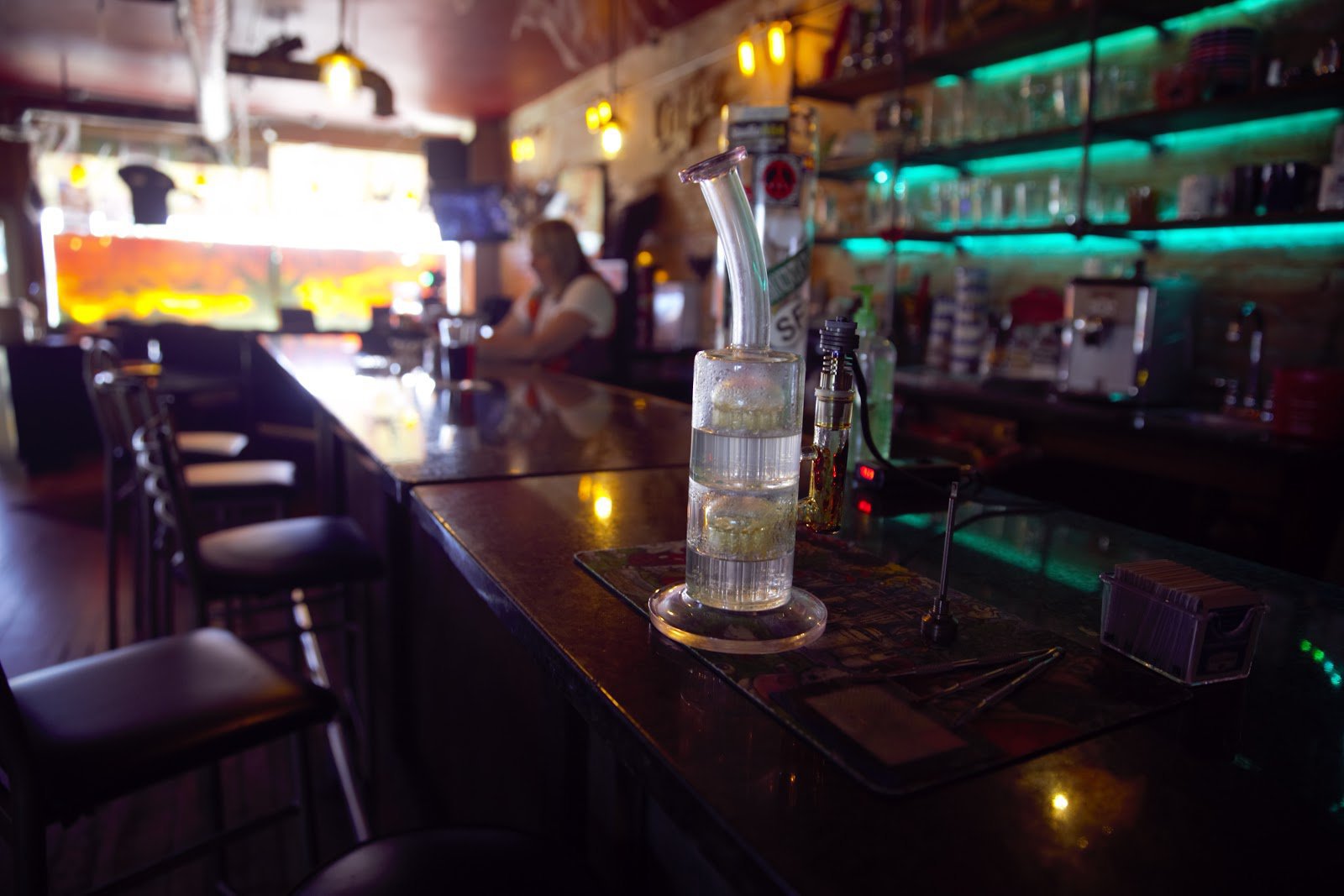
Above: Studio A64’s former downstairs area, which has since been replaced by an alcohol bar owned by another individual.
There’s an alcohol bar next door to your current location. What’s it like having a booze bar right beneath the weed bar?
It’s pretty eye-opening. The way that they act downstairs is appalling most of the time. They’re always screaming and yelling. People throw up on our staircase or pass out in the alley. It’s been a problem. Hopefully we can get it fixed.
The atmospheres [between the two bars] completely clash. It’s like oil and water. A lot of people think it’s really cool to have an alcohol bar right next to a cannabis bar. But it’s not cool at all; people don’t like it. People who like to smoke weed don’t like to drink, and they don’t want to put up with all the things that come with drinking. I think if the bar wasn’t there, our business would do significantly better.
Do you get a lot of new cannabis consumers visiting Studio A64 just to learn about weed? Or is it usually experienced tokers coming in?
It’s a lot of both. Tourists are pretty uneducated in terms of the different cannabis products available now. They don’t know about the different strains or the effects of those different strains.
People need to learn a lot of things regarding cannabis, and they definitely get an education when they come here. There’s a lack of education at dispensaries, especially recreational ones, because they have such high volumes of business that they can’t just sit and talk to people. It takes time for people to truly understand how to use the products correctly.
Your budtenders are incredibly knowledgeable. Do you select them based on their previous knowledge of cannabis, or do you train them to be that way?
Both. Everyone that’s worked there, so far, has either been someone that I’ve known or someone who’s hung out at the club for a long time. Obviously, during training, I talk to them a lot about how to make sure patrons know what they’re doing, and making sure they feel safe, and comfortable. If somebody does overindulge, we know what to do and how to help them.
It’s a learning process as you go.
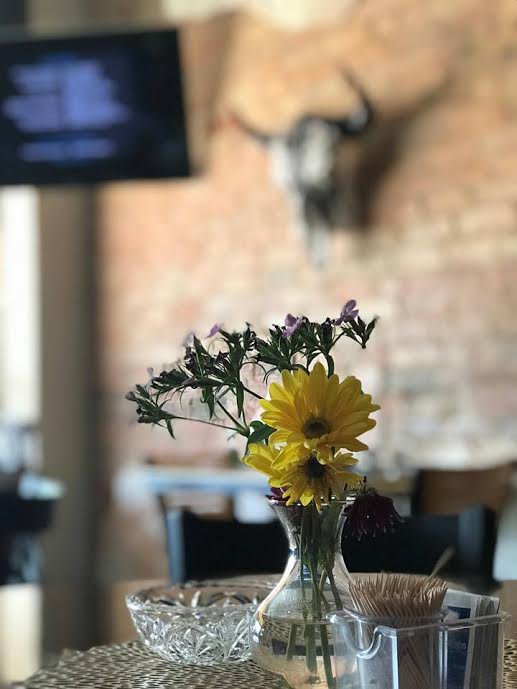
There’s a new pot café opening soon in West Hollywood, and it’s argued that the café is the first licensed club that can legally sell weed. What are your feelings about that?
If they’re actually able to sell product, they probably are the first licensed club to legally be able to sell. We’ve never had a license that said, Yes, go ahead and sell weed, which is what we’ve been working on for so long.
I’m not too threatened by it, though. There’s always people who are going to claim that they’re bigger and better and the first. To me, it’s not worth the fight. I’m not that kind of a person. We’ll put ourselves out there as much as we can — and claim our right, or whatever — but it is what it is.
Colorado had a really good opportunity to push this forward years ago, and didn’t. I think that’s a big mistake. It’s inevitable that social consumption is going to happen; it’s just a matter of time.
Any last thoughts you’d like to leave with our readers?
There’s a place for all of us. It’s time for everybody to become united and showed the government — or whoever needs to see — that we’re organized, we’re legitimate, and we’re a real business that can bring in a lot of money for a lot of people. If we can become a tourist attraction — which we already are — that can help out a lot of local businesses.
People need to realize that we’re here, and we’re not going anywhere. It’s time for people to just accept that, and let us operate our business the same way everyone else is able to operate theirs.
Follow Randy Robinson on Twitter
Source of article: https://merryjane.com/culture/meet-the-woman-whos-bringing-pot-cafes-to-the-entire-state-of-colorado

